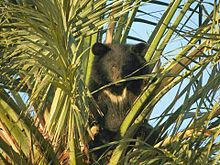Balochistan black bear
| Balochistan black bear | |
|---|---|

| |
| Scientific classification | |
| Domain: | Eukaryota |
| Kingdom: | Animalia |
| Phylum: | Chordata |
| Class: | Mammalia |
| Order: | Carnivora |
| Family: | Ursidae |
| Genus: | Ursus |
| Species: | |
| Subspecies: | U. t. gedrosianus
|
| Trinomial name | |
| Ursus thibetanus gedrosianus Blanford, 1877
| |

| |
| Synonyms | |
|
Selenarctos thibetanus gedrosianus | |
The Balochistan (or Baluchistan) black bear (Ursus thibetanus gedrosianus) is a
Characteristics
The Balochistan black bear has short, coarse fur ranging in colour from black to reddish brown. It is smaller than the other subspecies with a head and body length of 80 cm (31 in) including tail.[2]
Distribution and habitat
The Balochistan black bear inhabits the hilly areas of the Balochistan province in southwest Pakistan. It has been recorded in the Sulaiman Mountains, Khuzdar District and Kharan District.[2]
Behaviour and ecology
This species is
Threats
This section needs additional citations for verification. (October 2022) |
Balochistan black bears are captured by locals who try to raise them as pets for circuses and bear-baiting. In bear baiting, claws and canines of each bear are extracted and they are left to fight dogs. This practice was made unlawful and prohibited in 2001 but still occurs illegally to some extent.
It is now considered extinct in most of the area. Deforestation and loss of habitat is the greatest problem it faces.[4] Local and nomad herders let their cattle graze in the bear territory and end up in killing the native bears, blaming them for the killing of their livestock. Poaching for body parts like gall bladders for medicines is also a threat to the species.[5]
Conservation
In Pakistan, the Balochistan black bear is considered Critically Endangered.[2]
References
- ^ "Endangered Species". awionline.org.
- ^ a b c Sheikh, K. M.; Molur, S., eds. (2004). "Ursus thibetanus gedrosianus Blanford, 1877. Balochistan Black Bear". Status and Red List of Pakistan's Mammals. Based on the Conservation Assessment and Management Plan (PDF). Islamabad: IUCN Pakistan. p. 57.
- ^ "Balochistan Black Bear". Wwfpak.org. Archived from the original on 11 November 2017. Retrieved 1 November 2017.
- ^ "Baluchistan Black Bears - Bears Of The World". Bearsoftheworld.net. Retrieved 1 November 2017.
- ^ "Balochistan Bear -". Wildlife of Pakistan. Archived from the original on 1 September 2018. Retrieved 1 November 2017.

